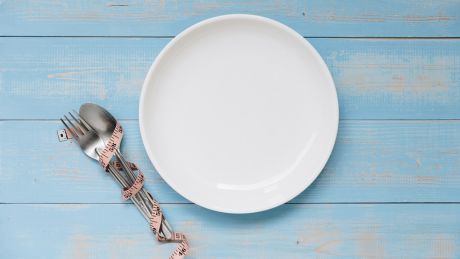Is Intermittent Fasting A Good Way To Lose Weight?
Before you start going days without food, read this expert advice on intermittent fasting

Going on a diet takes effort and some diets take a lot more effort than others. Any diet that requires you to count every calorie you consume on each and every day, for example, or diets that demand you cut out entire food groups, thereby requiring you to plan ahead constantly to make sure there’s something you can eat.
In contrast, intermittent fasting seems pretty simple. While you might have to count calories very closely for certain periods of the day or week, the rest of the time you don’t really have to think about what you eat. And given that any weight-loss diet’s success relies on creating a calorie deficit where you burn more than you consume, forgoing food for long periods seems likely to lead to success on that front.
However, there’s more to a healthy and effective diet than whether it helps you lose weight in the short term. To run the rule over intermittent fasting, we spoke to Elliot Moore, lifestyle health adviser for Bupa UK.
What does intermittent fasting involve?
Intermittent fasting is an eating pattern where you switch between periods of eating and fasting. There are a few different methods of intermittent fasting, and these are among the most common:
The 5:2 diet This involves eating a normal diet on five days of the week and fasting on the other two days. During fasting days, you significantly reduce the amount of calories you eat to around either 500 or 600 calories.
Alternate day fasting This is similar to the 5:2 diet in that alternate day fasting involves eating normally on some days of the week, while fasting on others. Rather than fasting for only two days a week, however, you fast every other day.
Time-restricted fasting This involves setting an eating “window” – a set timeframe each day where you allow yourself to eat. For example, you could choose to fast for 16 hours a day, and eat normally during the other eight hours. Or you may choose to fast for 20 hours per day and allow a four-hour eating period.
Get the Coach Newsletter
Sign up for workout ideas, training advice, reviews of the latest gear and more.
Can intermittent fasting help you lose weight?
There is some evidence that suggests intermittent fasting helps with weight loss. In order to lose weight, you need to experience a shortage of energy and any of the intermittent fasting strategies listed above should result in your overall energy intake being reduced by the end of a given week. But, although it may help you lose weight, there’s no evidence that this type of diet is any more effective than simply reducing how many calories you have each day.
See related
Are there any risks?
Reducing how much you eat by a large amount can sometimes lead to irritability, poor concentration, tiredness, headaches or dizziness. Apart from this, intermittent fasting is not very easy to stick to, especially in the long term. Fasting isn’t appropriate for everyone – for example if you have diabetes or take medication that requires food intake. You may also find this type of dieting difficult if you’re used to eating every few hours. If you are considering intermittent fasting, you should get your health checked first, or speak with your GP or a qualified dietitian, in case this diet isn’t suitable for you.
What’s your verdict on intermittent fasting?
Many diets are popular because they’re seen as a quick fix, but sadly there’s no such thing. Although you may lose some weight at first, you often won’t sustain that weight loss in the long run. A balanced and unprocessed diet that’s rich in fruits, vegetables, lean meats and fish, coupled with regular exercise, is the best way to lose weight safely. You also need to think about your lifestyle as a whole and set yourself realistic, achievable goals, and remember to track your progress.

Nick Harris-Fry is a journalist who has been covering health and fitness since 2015. Nick is an avid runner, covering 70-110km a week, which gives him ample opportunity to test a wide range of running shoes and running gear. He is also the chief tester for fitness trackers and running watches, treadmills and exercise bikes, and workout headphones.
